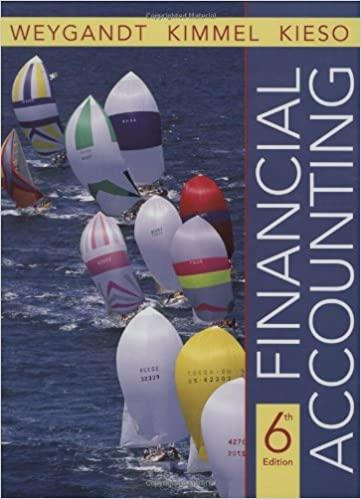Answered step by step
Verified Expert Solution
Question
1 Approved Answer
Basket Wallets produces several different styles of wallets. Management estimates that during the first quarter of this year, the company will operate at about 8
Basket Wallets produces several different styles of wallets.
Management estimates that during the first quarter of this year, the
company will operate at about of normal capacity. Two special orders
have been received, and management is making a decision about whether
to accept either or both orders.
The first order is from Wallys The manager would like to market a
wallet similar to one of Baskets current models. Wallys wants its own label
on the cases and is willing to pay $ per wallet for wallets to be
shipped by April The cost data for Baskets wallet that is similar to the
requested case follow:
Selling price per unit $
Cost per unit
Raw Materials $
Direct labour hr @ $ $
Overhead machine hr @$ $
$
According to the specifications supplied by Wallys the special order
case requires less expensive raw materials. Therefore, the raw materials
for the special order will cost $ per case. Management believes that
the rest of the costs, labour time, and machine time will remain the same as
for Baskets wallet.
The second order is from the Green Origin Company. Its managers
want wallets for $ per wallet. These wallets, to be marketed
under the Green Origin label, would also need to be shipped by April
However, these wallets are somewhat different from any wallets currently
manufactured by Basket. Following are the estimated unit costs:
Cost per unit
Raw Materials $
Direct labour hr @ $ $
Overhead machine hr @$ $
$
In addition to these perunit costs, Basket would incur $ in setup
costs and would need to purchase $ in special equipment to
manufacture these wallets. Currently, Basket would have no other use for
the equipment once this order was filled.
Baskets capacity constraint is total machine hours available. The
plant capacity under normal operations is machine hours per year,
or hours per month. Fixed manufacturing overhead costs are
allocated to production on the basis of machine hours at $ per hour
and are budgeted at $ per year.
Basket can work on the special orders throughout the entire first
quarter, in addition to performing its normal production. Baskets managers
do not expect any repeat sales to be generated from either special order.
INFORMATION ANALYSIS
The following questions will help you analyze the information for this
problem. Please include the answers to these questions in your appendix.
A What is the excess capacity of machine hours available in the first
quarter? Explain how machine hour capacity affects the special
order decision.
B Ignore the Green Origin order. What is the minimum acceptable
price for the Wallys order?
C Ignore the Wally order. What is the contribution margin per case
for the Green Origin order? What would be the total expected
profitloss incurred by accepting this order?
D Using only quantitative information, decide which special orders
Basket should accept.
E What qualitative factors are likely to be important to this decision?
F Identify and explain risks that affect Baskets decision.
WRITTEN ASSIGMENT
Write a memo to Baskets management, recommending whether
the company should accept each of the special orders. Attach to
the memo a schedule that shows your computations. As
appropriate, refer to the schedule in the memo.
Write one or two paragraphs explaining how you decided what
information to include in your memo.
Step by Step Solution
There are 3 Steps involved in it
Step: 1

Get Instant Access to Expert-Tailored Solutions
See step-by-step solutions with expert insights and AI powered tools for academic success
Step: 2

Step: 3

Ace Your Homework with AI
Get the answers you need in no time with our AI-driven, step-by-step assistance
Get Started


